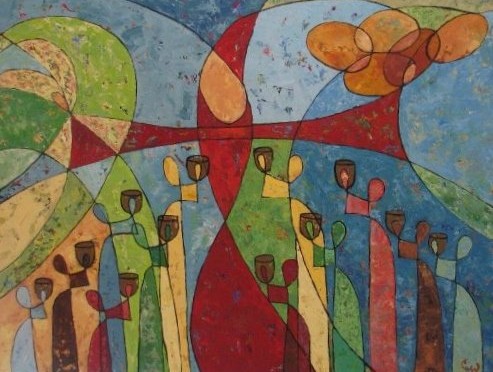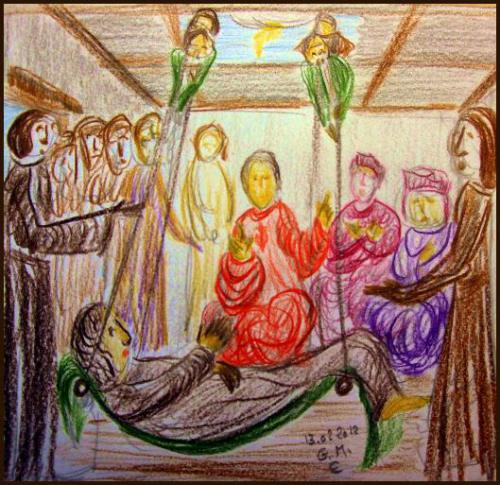Scripture, Snort-Laughing, and Offense – John 6:56-69 and Ephesians 6:10-20
Pastor Caitlin Trussell with Augustana Lutheran Church, Denver on August 23, 2015
John 6:56-69 [Jesus said] Those who eat my flesh and drink my blood abide in me, and I in them. 57 Just as the living Father sent me, and I live because of the Father, so whoever eats me will live because of me. 58 This is the bread that came down from heaven, not like that which your ancestors ate, and they died. But the one who eats this bread will live forever.” 59 He said these things while he was teaching in the synagogue at Capernaum. 60 When many of his disciples heard it, they said, “This teaching is difficult; who can accept it?” 61 But Jesus, being aware that his disciples were complaining about it, said to them, “Does this offend you? 62 Then what if you were to see the Son of Man ascending to where he was before? 63 It is the spirit that gives life; the flesh is useless. The words that I have spoken to you are spirit and life. 64 But among you there are some who do not believe.” For Jesus knew from the first who were the ones that did not believe, and who was the one that would betray him. 65 And he said, “For this reason I have told you that no one can come to me unless it is granted by the Father.” 66 Because of this many of his disciples turned back and no longer went about with him. 67 So Jesus asked the twelve, “Do you also wish to go away?” 68 Simon Peter answered him, “Lord, to whom can we go? You have the words of eternal life. 69 We have come to believe and know that you are the Holy One of God.”
“Well, I never!” Mmmmm….those words can feel good. Or, at least, words like them can feel good. Or the feeling can feel good. I’m talking about the righteous indignation of being offended. Think about your favorite political pundits or satirists. I’m not going to name names. You can come up with plenty and I don’t really want to give them air time here. But you know the types. They range across social, religious, and political spectrums. And you know the feeling when you listen to them. Well, on this I’ll speak for myself. I know that feeling. That feeling of sweet relief. Aligning with them. Being offended with them. Grumbling with them against whatever group may or may not seem to get the issue you’re aligning with that day.
The disciples were complaining to each other. It helps doesn’t it? To have a pal or two or three to share our complaints. Or in this day and age of social media, several million, to share in our offense? Offense is in air. We breathe it in. We exchange it in Facebook memes and YouTube videos. It’s a calorie-free guilty pleasure.
Now I don’t know how Jesus says what he says to these disciples. I like to believe he is somewhat less abrasive and truly do believe he is a gazillion times more neighborly than the aforementioned purveyors of offense. We’re in the sixth week of the bread of life stories that John tells about Jesus in the sixth chapter of the Gospel. Jesus began by feeding people actual bread and fish. He ends by telling people they need to eat his flesh and blood which is, at best, terribly offensive, and is, at worst, simply terrifying.
The disciples’ complaint is, “This teaching is difficult; who can accept it?” … …Yup, that’s it. Tame by today’s reality TV standards, really. That’s what we get by way of their grumbling. Well, you know what? It IS hard! I was driving home from sushi with my husband Rob talking about this scripture and snort-laughing at how funny this scripture is for today. We’ve spent six weeks on Jesus as bread, eating Jesus flesh and blood, and all the disciples can say is its difficult?
Thomas Aquinas wrote 3,000 pages exegeting the Bible in the Summa alone. Luther’s Works have been published in 55 volumes that include sermons, Bible commentaries, and thoughts about Christian life. Those are only two theologians in the last 2,000 years. My office can’t absorb all the books that I want to stuff into it. I been in some of your homes. I’ve seen book shelves struggle similarly. These teachings of Jesus are hard! Some of us must love a good puzzle.
A little less than two weeks ago, Augustana’s staff retreat happened. The faculty of the Institute for Life and Care led the six hour class. Each faculty was bi-vocational. Each was ordained in their Christian denomination and also held other professional degrees – One an R.N., the other a physicist, and the third a social worker. There was a little something for everybody. It was a good time to be together as staff having just prayed Pastor Tim Godspeed and preparing to welcome Pastor Jim’s leadership. Typical of this kind of retreat, and what makes them so valuable, is being reminded of the individual strengths we each bring to the whole and our shared anchor in the gospel.
Also typical of this kind of retreat, there were visual aids. One such visual aid was an hour glass. We were talking about theories of transition and reactions to transition – anxiety being one of them. Deacon Kellogg held up the hour glass and pointed to coarse, black grains of sand passing through the mid-point. She said, “This is now.” She pointed to the mass of black sand at the top and said, “This is the future.” And she pointed to accumulating sand in the bottom and said, “This is the past.” Her main point was about transition – that the anxiety of the future and that the guilt and shame of the past have no business in the moment of now. So easy to say, so difficult to live.
The disciples’ complaints show that they are stuck in the now. They are anxious about the now. Their lack understanding as if they’ll never get it. It’s like the grain of sand is stuck in the hourglass and the pressure is building as if the past has no information and the future won’t bring any. They have no frame of reference past or future. It is the false urgency of “now” that is killing them.
Jesus goes on to ask his disciples, “Does this offend you?” It’s become too much. Some of the disciples can’t take it. They turn back, no longer going about with him. Not so different than many of us who are here together today. And not so different than many who are not here in worship with us today. Offended by what we have heard by Jesus or about Jesus at one point or another. Or offended by what we have seen done at church or by another church member one point or another. We have given it a break. Given Jesus a break. Or given church a break. Some of us make no distinction. Some of us make a nuanced distinction but leave the church regardless.
Those disciples in the Bible story are together in a synagogue. We are together here this morning. We sit across time but not so distant in the experience of confusion when the teaching gets difficult or when church gets difficult.
The question that Jesus asks can get very real, very quickly for us. “Does this offend you?” And, before we even realize what’s happening, we turn back and walk away. Because, in part, the teaching actually IS offensive. I’ve been there and often still am there. Now back in church for almost two decades and still piecing it together when there’s a crazy Bible verse. I’m no longer panicked when the answers aren’t there. Curious rather than panicked when scripture is offensive.
Jesus turns to the other disciples and asks them, “Do you also wish to go away?” Simon Peter answers for the class, “Lord, to whom can we go? You have the words of eternal life.” This is one of the great answers that saves Peter’s reputation after all those other answers of buffoonery for which we usually get to make fun of him. It’s also one of the great examples of how scripture oozes out of the words we use in liturgical worship. You’ll recognize it as the language of the Gospel Acclamation we sang today, and often sing, as we stand to hear the Bible from the Gospel read.
“Lord, to whom can we go? You have the words of eternal life.” In the Gospel of John, the eternal shows up in the present moment in the person of Jesus. This is explicit in the Gospel of John. The sand in the mid-point in the hour-glass is full of the eternal because Jesus is there. It’s called Kairos time, God’s time. The disciples who turn away, offended, miss out on Jesus, the eternal one present in the flesh.
People of God, we find ourselves in a moment in time when being offended is the norm. Offense is THE go-to reaction across the spectrum of many kinds of ideologies. People of God, we are given an alternative response to this reaction. The Apostle Paul in the Ephesians reading today tells us that the armor of God includes shoes that make us “ready to proclaim the gospel of peace” (Eph 6:15). Go back this week and read that Ephesians reading. Chapter 6. Verses 10-20. It is full-force, standing fast against evil, etcetera…etcetera…to PROCLAIM A GOSPEL OF PEACE. How can we proclaim a gospel of peace if we are running around offended and reactive along with everyone else? Tricky at best, I would say.
Jesus asks, “Do you also wish to go away?” Simon Peter answered him, “Lord, to whom can we go? You have the words of eternal life. We have come to believe and know that you are the Holy One of God.”
This is Simon Peter’s confession of faith drawn out by Jesus. There is a range of confessions here among us this morning. If I had to guess, I’d bet our answers range from the clunky and doubt-loaded to those just as elegant and faith-drenched as Peter’s.
Here is the good news, the offense of the gospel, the thing that took Jesus to the cross: God loves you, no matter what it is you have done, no matter what it is you have left undone. God’s forgiveness and love of you is unconditional, + in the name of Christ, and all that is holy, be at peace. Amen.
Ephesians 6:10-20
Finally, be strong in the Lord and in the strength of his power. 11 Put on the whole armor of God, so that you may be able to stand against the wiles of the devil. 12 For our struggle is not against enemies of blood and flesh, but against the rulers, against the authorities, against the cosmic powers of this present darkness, against the spiritual forces of evil in the heavenly places. 13 Therefore take up the whole armor of God, so that you may be able to withstand on that evil day, and having done everything, to stand firm. 14 Stand therefore, and fasten the belt of truth around your waist, and put on the breastplate of righteousness. 15 As shoes for your feet put on whatever will make you ready to proclaim the gospel of peace. 16 With all of these, take the shield of faith, with which you will be able to quench all the flaming arrows of the evil one. 17 Take the helmet of salvation, and the sword of the Spirit, which is the word of God. 18 Pray in the Spirit at all times in every prayer and supplication. To that end keep alert and always persevere in supplication for all the saints. 19 Pray also for me, so that when I speak, a message may be given to me to make known with boldness the mystery of the gospel, 20 for which I am an ambassador in chains. Pray that I may declare it boldly, as I must speak.






![It’s Going to the Birds [In a Markan, Hitchcockian Kind of Way] – Mark 4:26-34, 2 Corinthians 5:6-7, 14-20](http://caitlintrussell.org/wp-content/uploads/2015/06/Mustard-Seed-and-Bird.sermon-Caitlin-Trussell.jpg)




